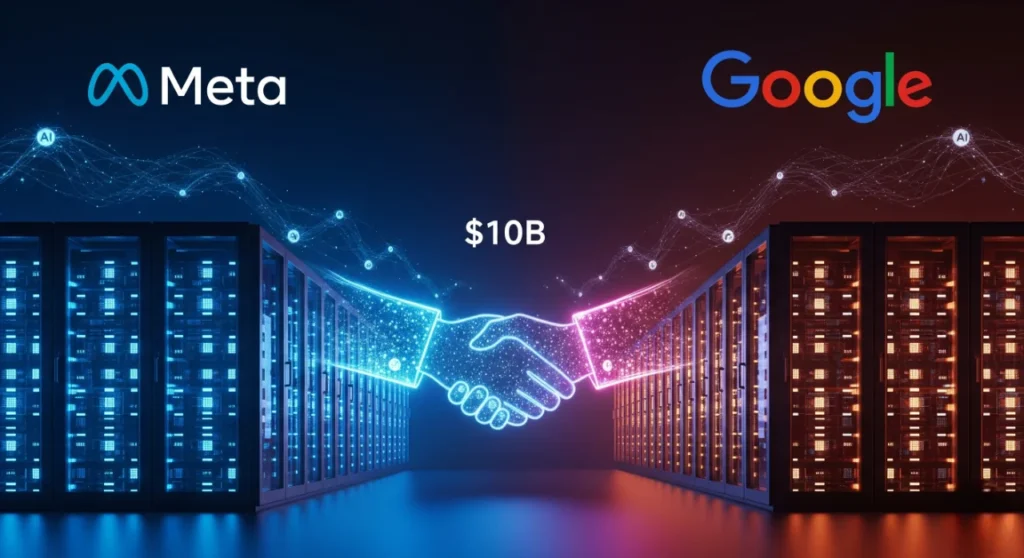Meta is striking a huge bet on AI infrastructure.
According to multiple sources, the Facebook-parent has signed a six-year, over $10 billion cloud computing deal with Google Cloud to support its burgeoning artificial-intelligence workloads — a potential game-changer in the tech space.
The move comes amid aggressive AI infrastructure expansion and intense competition in the cloud services sector.
Key Takeaways
- Meta commits $10B+ over six years to Google Cloud.
- Focus is on AI infrastructure and compute scaling.
- Google Cloud gains a high-profile big-tech client amid strong growth.
- The deal intensifies the AI infrastructure arms race.
- Could shift power dynamics in cloud computing and AI.
Meta and Google have reportedly signed a six-year cloud services agreement worth over $10 billion, under which Meta will use Google Cloud’s servers, storage, networking, and other infrastructure to support its AI computing needs.
Meta and Google Cement $10B+ AI Infrastructure Alliance
Meta Platforms has entered into a six-year cloud computing agreement with Google, valued at over $10 billion, according to Reuters and other sources.
Under the deal, Meta will tap into Google Cloud’s infrastructure — including servers, storage, networking, and related services — primarily to power its artificial-intelligence workloads.
Both companies have not issued immediate public comment on the arrangement.
Why Now?
Meta has been aggressively ramping up AI infrastructure investments, with CEO Mark Zuckerberg signalling earlier in mid-2025 that the company plans to spend hundreds of billions of dollars on AI data centers and compute capacity.
With multiple massive data center projects in the pipeline, Meta is seeking partners to accelerate the timeline and supplement its internal capacity.
One terse human reaction:
“This gives Meta a critical fast-lane path to compute while they build out their own data centers,” said one industry consultant familiar with cloud infrastructure rollouts.
Competitive Cloud Landscape
For Google Cloud, the deal is a major coup — gaining a marquee tech client and reinforcing its position in the AI-related cloud services market. The company has seen strong revenue growth, over 30% year-over-year in recent quarters, reflecting soaring demand for AI infrastructure.
This comes amid intense competition among cloud giants — including AWS, Microsoft Azure, and Google Cloud — to secure contracts with AI-focused customers. Earlier this year, Google Cloud also entered into an agreement with OpenAI, marking another major AI infrastructure client win.
Why It Matters
This deal supercharges Meta’s AI compute scale in the short and medium term while fast-tracking infrastructure deployment. It also elevates Google Cloud’s credentials in the AI services domain and reshapes competition among cloud providers to capture the AI future.
Numbers to Watch
- $10+ billion — estimated deal value.
- 6 years — length of the agreement.
- 30–35%+ — recent year-over-year growth in Google Cloud revenues.
Expert Insight
Alexandr Wang, Meta’s Chief AI Officer, recently reaffirmed that investment in infrastructure and AI talent remains a top priority, quashing rumors of any major slowdowns.
An industry analyst at a leading cloud research firm commented:
“Few companies can claim the compute appetite that Meta has. Partnering with Google Cloud gives them runway to scale immediately instead of waiting years for in-house builds.” (Analyst brief, 2025)
What’s Next
- Meta may accelerate AI deployment across its platforms (Facebook, Instagram, WhatsApp).
- Google Cloud could use this as a call to action to sign more AI-heavy enterprise deals.
- Competitors (AWS, Azure) may pitch counter-offers to rival clients.
- Regulators could scrutinize the extent of consolidation of infrastructure in AI compute markets.
Conclusion
Meta’s multi-billion-dollar multi-year cloud pact with Google supercharges its AI ambitions, bridging the gap between compute demand and capacity. For Google Cloud, it’s a strategic win in the AI infrastructure arms race. What this means for tomorrow: we may see faster rollout of new AI features, intensifying rivalry among cloud providers, and consumers experiencing AI-powered services sooner. What feature will show up in your apps next — and how fast?
